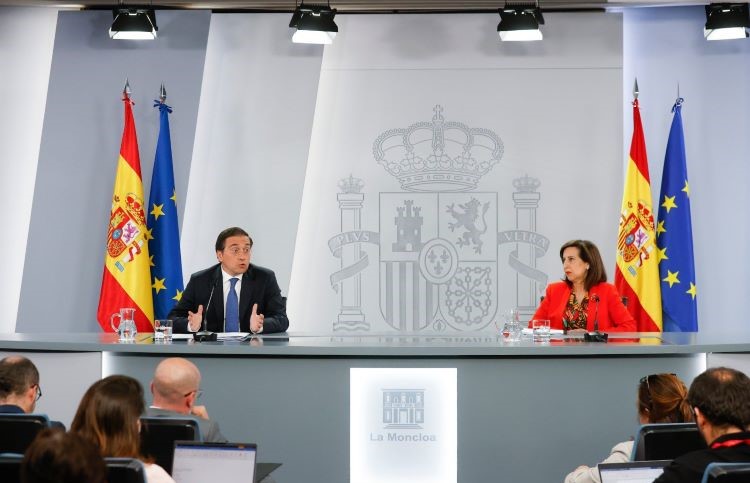Eduardo González
The Ministers of Foreign Affairs, José Manuel Albares, and Defense, Margarita Robles, yesterday stressed the importance of the Southern Flank in the Strategic Concept to be approved next week during the NATO Summit in Madrid, given the “increasing presence” of Russia in Africa.
“The Madrid Strategic Concept will address security threats in the next decade,” Albares stated during a joint press conference with Robles at the La Moncloa complex to address the upcoming NATO Summit, to be hosted by Madrid on June 28-29. In this framework, he continued, “Spain expects a firm response to the threats from the Eastern Flank, especially from Russia, but also a look at the threat from the Southern Flank, within the concept of NATO 360 degrees,” he continued.
During the Summit, according to the minister, two specific meetings are expected to be dedicated to this topic. On the one hand, there will be a specific session of the heads of state and government on the Southern Flank and, on the other hand, on the evening of June 29 there will be a working dinner of foreign ministers in which the representatives of two NATO partner countries, Jordan and Mauritania, will participate.
According to Albares, on the Southern Flank, phenomena already occurring on the Eastern Flank are taking place, such as “the political use of irregular emigration to put pressure on the territorial sovereignty of States, as has been seen in Belarus, and energy blackmail to change the sovereign decisions of States, as we have seen with Russia towards independent States”.
The minister made no specific mention of either Morocco or Algeria with regard to these two forms of pressure, and limited himself to assuring, in response to a question expressly related to this second country, that “the Strategic Concept does not go against anyone and only aims to fix threats that exist and will exist in the next decade anywhere, but no one can feel directly observed or singled out.” “Unfortunately, threats from the south are increasingly Russian threats from the south,” he warned. As for the possibility of possible Moroccan pressures on Ceuta and Melilla being addressed, Albares recalled that “NATO Secretary General Jens Stoltenberg has said several times in recent times that every inch of allied territory is perfectly guaranteed by the solidarity of the member states.”
For her part, Robles warned that “Russia’s presence in African countries is more than proven in Central African Republic and Mali and other countries” and assured that Moscow has taken advantage of “coups d’état in certain countries to send military aid, in arms and personnel”. “NATO is not against anyone, there is a reality, an expansion on the part of Russia and an increase in jihadism and terrorism” and, therefore, it is necessary to “foresee international scenarios” in “the most vulnerable countries due to drought and coups d’état”, she added.
She also assured that at the Summit there will be a specific session on “the role of China in Africa, which is very important, not from the military point of view but from the economic point of view”. According to Robles, the defense of the importance of the Southern Flank “is not incompatible” with the US interest in dealing more with the Indo-Pacific region, since, at the recent meeting of NATO defense ministers, “all the countries, including the United States, showed unity with respect to the situation in Africa”.
Speech by Zelenski
On the other hand, Albares informed that the Summit will be attended by “44 delegations, 41 of them headed by heads of State and Government, in addition to the Ministers of Foreign Affairs and Defense”. Specifically, all 30 member states will be present, plus Bosnia and Herzegovina, Jordan, Mauritania, Japan, Australia, New Zealand, South Korea, “Ukraine of course”, EU leaders and “non-NATO EU countries, such as Finland and Sweden, Austria, Malta, Cyprus and Ireland”.
According to the minister, the Summit will devote a special session to Ukraine, whose president, Volodimir Zelenski, “will be present at the meeting via videoconference.” “He has been invited, of course, to participate, and will do so by videoconference, but if he wants to come to Madrid we would be delighted and would welcome him, although one must understand the extreme circumstances and the absolute complexity of President Zelenski to enter and leave the country; in any case, the decision is his”, he explained.
Podemos and PP
The political debate generated within Spain around the Summit was also not lacking in yesterday’s press conference, especially after the secretary general of Podemos and Minister of Social Rights and Agenda 2030, Ione Belarra, declared yesterday that “it is not the time to increase military spending, but to increase social protection” because “with bullets you do not eat, with bombs you do not cure and with tanks you do not put out fires.”
“Spain has been chosen” to host the Summit “because Spain is a serious and credible country, a reliable ally with a clear, resounding and forceful foreign and security policy,” Margarita Robles assured. Therefore, she added, “personal statements are very respectable, but they do not affect Spain’s firm commitment, which is respected and appreciated by many allies”.
The minister also launched her darts against the PP’s criticism of the Government for not having counted on the main opposition party in the organization of the Summit. “Spain does not design the Summit, it is designed by the Atlantic Council and the secretary general, and Spain is the host,” Robles recalled. “The success is Spain’s, not just the government’s, and if the PP is truly a state party, it should be happy about Spain’s place in the world,” because “this is not the most appropriate time to engage in partisan politics with something as important as security and NATO,” she warned.







